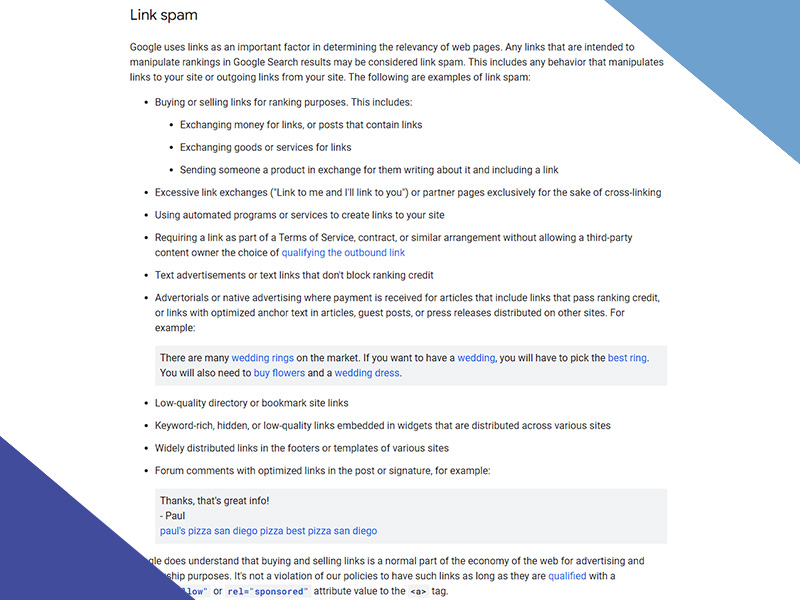The Only Way White Hat Link Building Services Can Exist
In the world of SEO, many try to tout their link building service as being “white hat”. The problem with this claim is that these sellers are building backlinks on their private blog networks (PBNs), doing outreach for backlinks, or they’re spamming blogs with comments.
These types of services all fall under what’s defined as “link spam“, formerly known as “link schemes”, according to the Google Search Essentials, formerly known as the Google Webmaster Guidelines. Google also needs to stop changing the name of everything…
Link spam
Google Search Essentials (Formerly Webmaster Guidelines) | Google Search Central | Documentation | Google for Developers, Google, developers.google.com/search/docs/essentials/. Accessed 1 Feb. 2024.
Google uses links as an important factor in determining the relevancy of web pages. Any links that are intended to manipulate rankings in Google Search results may be considered link spam. This includes any behavior that manipulates links to your site or outgoing links from your site. The following are examples of link spam:
They elaborate more on this in the link spam section of the Google Search Essentials, but you get the point.
So, How Can A White Hat Link Building Service Exist?
With this in mind, you now know that trying to get backlinks in any way to manipulate your web rankings is against Google’s terms of service. You’d think there would be no way that someone could offer a white hat link building service.
But wait, there is!
The answer was provided directly by Google on the same page they define link spam.
Google does understand that buying and selling links is a normal part of the economy of the web for advertising and sponsorship purposes. It’s not a violation of our policies to have such links as long as they are qualified with a rel=”nofollow” or rel=”sponsored” attribute value to the <a> tag
Google Search Essentials (Formerly Webmaster Guidelines) | Google Search Central | Documentation | Google for Developers, Google, developers.google.com/search/docs/essentials/spam-policies#link-spam. Accessed 1 Feb. 2024.
Summarised, if someone offers a service to advertise a website in the form of, let’s say a paid article, and adds a “nofollow” or “sponsored” tag; then this would be allowed under Google’s guidelines and would thus be a white hat link building service. Neat, right?
Why You Will Rarely See A White Hat Link Building Service
Of course, just because there’s a way to offer a white hat link building service does not mean you’ll see these services often. That’s because the “nofollow” and “sponsored” tags do not pass on what’s referred to as link equity. If you don’t know what link equity is, think of it like a copper wire that passes electricity to the next part of the circuit. Those tags would be like a wire made out of rubber: you can physically follow it to the next part of the circuit, but it wouldn’t pass on any power since rubber is non-conductive. The analogy isn’t perfect, but surely you see the issue here.
Link equity is what’s sought after by most SEOs, so if a service does not offer do-follow links, it will be deemed as “worthless”.
Conclusion: Should You Order From A White Hat Link Building Service?
Of course! It’s important to diversity your backlink profile, as this is what would normally occur if you didn’t try to influence your website’s backlink profile.
These links really are not as useless as many SEOs believe them to be. Having a sponsored or nofollow link on the right website can drive traffic to your website and result in backlinks from other webmasters if your content is good enough. This is how largely how Google wants things to go, but how you want to go is ultimately a decision on you can make.
- Slow Website? Consider Robots As Being The Culprit - June 24, 2025
- My Experience Accepting Crypto Payments For The First Time - April 25, 2025
- Are Forums Dying? A Look Into Forums As A Whole - April 22, 2025


Leave a Reply